Why choose DPOL® for water pollution cleanup?
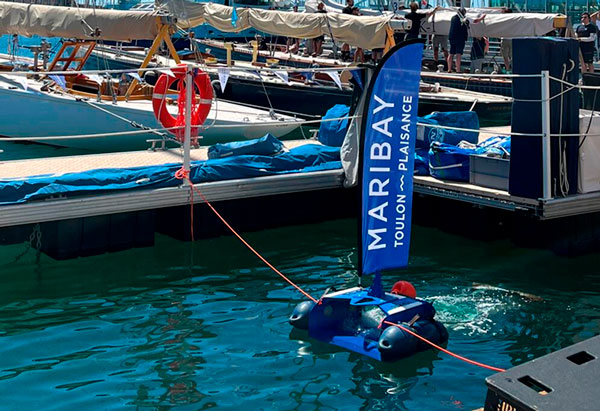
Autonomous & Hassle-Free Technology
The DPOL® robot works on its own, without constant supervision, and adapts to water movements. It collects floating waste day and night, with human intervention limited to emptying the net.
No electronics, no complexity: just launch it in a natural accumulation zone. It saves precious time and brings total peace of mind to your teams—so they can focus on what matters most.
Operates 24/7
Runs continuously, without interruption
Autonomous
It collects, you stay focused on your priorities
Robust & Low-Tech robot
Made of marine-grade aluminum, the DPOL® robot withstands even the toughest conditions. It operates in all weather, including wind and waves.
A true low-tech spirit: the simplicity of its operating system is DPOL®’s greatest strength. Thanks to its dual-flow design, the pump never comes into contact with the waste, so clogging is minimal. It can run continuously—without interruption.
Corrosion-Resistant
Durable, anti-corrosion materials
Minimal Maintenance
No risk of definitve breakdowns
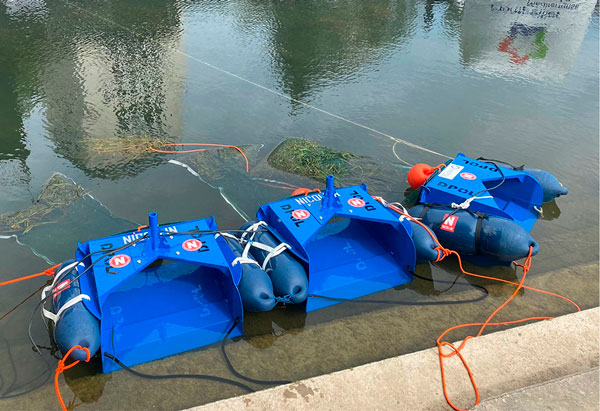
Looking for a solution to clean up your waters?
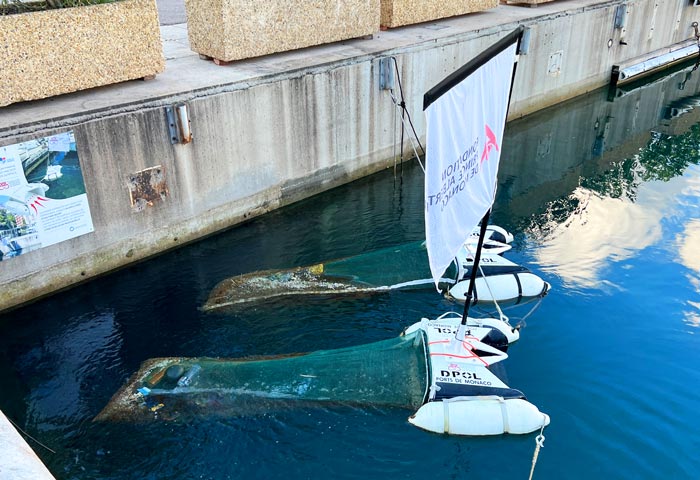
Setting the standard in floating debris cleanup
Over 220 DPOL® units are already in operation worldwide. Thanks to our international distribution network and streamlined logistics, we ensure fast delivery across all continents.
Our technology is now the most widely deployed in ports and marinas, and is highly regarded by leading infrastructure managers who prioritize performance and cost-efficiency.
220+ Robots
Deployed in over 18 countries
Best Price
The most affordable robot on the market
Depollute water cost-effectively
The DPOL® robot is a profitable investment: your staff can focus on essential tasks, and your clients will appreciate the cleanliness of your water area.
It’s also an economical solution: a one-time purchase, with no heavy maintenance required. No hidden fees, no costly consumables. Every day, it saves you time and money—while helping you communicate a strong, positive environmental message.
Smart Investment
No hidden fees or subscriptions
Time Saver
DPOL® keeps your water clean—automatically
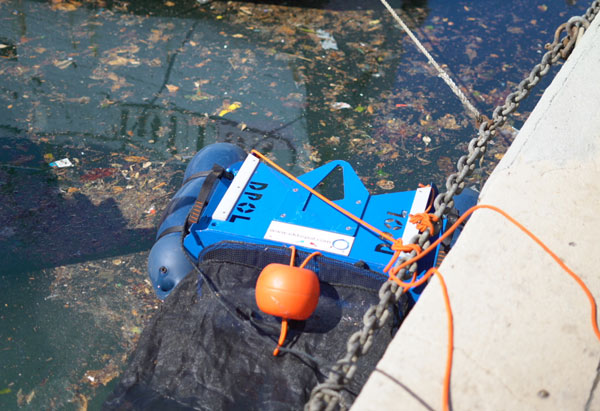
One technology, endless aquatic possibilities
Marinas &
leisure ports
Industrial areas
& shipyards
Lakes &
beach facilities
Local authorities &
public stakeholders
Seaside resorts
and hotels
Inland
waterways
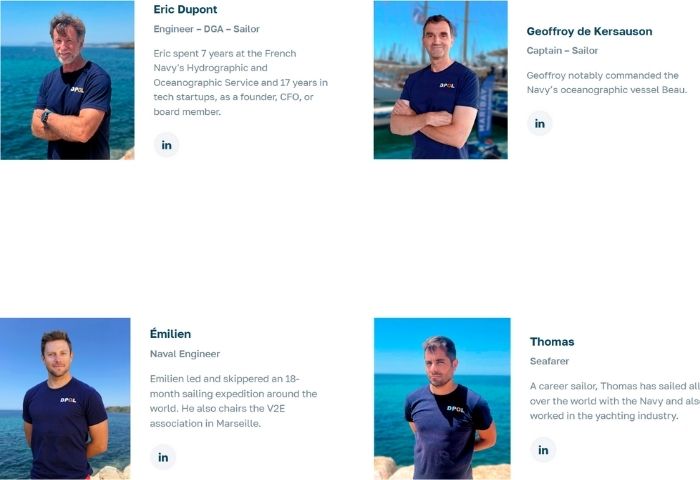
Designed by a Team of Sailors
Our robots are designed and manufactured in France by a team of sailors and marine pollution experts.
We put this technical expertise to work in a solution tailored to the real-world challenges faced by marine professionals—meeting their needs as closely as possible.
By choosing DPOL®, you benefit from a truly operational tool and full support to find the solution that fits you.
Made in France
Solid assembly & fast support
True Expertise
Over 35 years of experience
Technical & Operational FAQs
Where to install the DPOL®?
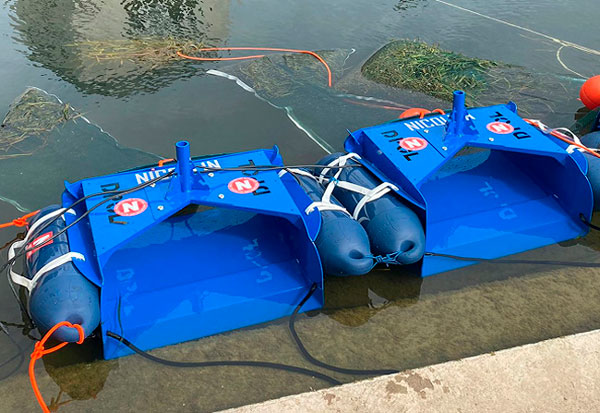
In ports, floating pollutants such as waste and hydrocarbons tend to accumulate in corners where wind and currents naturally carry them. To maximize recovery performance, the DPOL® should be positioned where these pollutants naturally converge.
Thanks to its lightweight design and easy handling, the robot can be repositioned without any equipment. Its compact size means it doesn’t take up the space of a boat and does not interfere with port operations or maneuvering.
How to install the DPOL®?
The DPOL® weighs 31 kg and can be easily carried by two people. It is launched by simply placing it into the water from a dock or a boat. Once deployed, secure it in the desired location using two mooring lines.
The DPOL® Max version, with a weight of 60 kg, requires a lifting device for safe handling and installation.
Does the DPOL® need to be plugged in continuously?
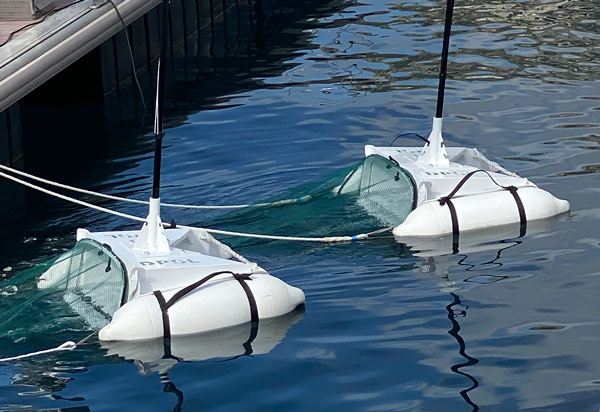
Once moored, the DPOL® waste collector must be connected to a power source to operate.
Its low power requirement allows it to run on a generator or a portable battery if the electrical grid is not accessible. The power cable length can also be adjusted to suit the installation.
Is the DPOL® a drone?
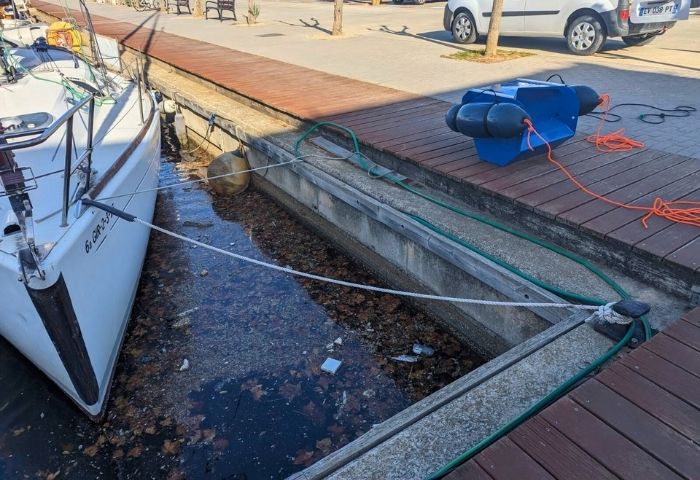
No — unlike a drone, the DPOL® robot is not remotely operated. And that’s by design: floating waste doesn’t drift randomly. It naturally accumulates in specific areas due to water currents, wind, and the shape of the basin.
Our device is strategically placed in these accumulation zones and draws in debris using its suction flow. There’s no need for remote control — it works continuously, exactly where it’s needed, with far greater efficiency than operated devices.
What types of pollution can the DPOL® collect?
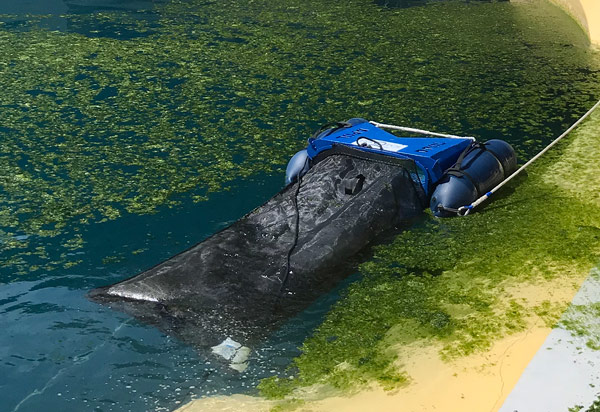
The DPOL® Max is designed to collect floating waste up to 120 cm in length — including various plastics, cans, cigarette butts, cardboard, vegetation, and algae.
The DPOL® Classic and DPOL® HD models are suitable for floating waste up to 60 cm. In addition to solid debris, they are also effective in treating surface oil pollution.
How can I collect hydrocarbons?
Tests conducted at CEDRE® enabled us to develop an optional kit perfectly suited for the DPOL® to efficiently collect surface hydrocarbons. This kit includes:
85 liters of absorbent spaghetti, placed inside the net
1 floating boom with skirt, designed to contain pollution around the DPOL® net and accelerate pollutant capture
How do I empty the DPOL® net?
When the net is full, simply pull vertically on the soft handle using your hand or a boat hook. Then disconnect the power supply.
The contents of the net can be emptied into a bin suitable for the collected waste. All our nets are reusable.
The DPOL® Max net may weigh up to 500 kg, so a lifting device is required for safe handling.
We offer a range of five net types, each designed to suit different pollution scenarios and operational needs.
Should the DPOL® be taken out of the water every day?
No — the DPOL® must remain in the water continuously to operate effectively. As long as its pump is running, it performs uninterrupted cleaning.
Its dual-flow operating system prevents polluted water from passing through the pump. To reduce fouling and simplify maintenance, antifouling paint is applied to the HD and Max versions.
We recommend removing the DPOL® from the water twice a month for cleaning with a brush or high-pressure washer to prevent fouling on the hull.
Regular monitoring of the net’s fill level is also advised to maximize collection efficiency. Our clients typically empty their nets between twice a day and once a week, depending on pollution levels.
Is the DPOL® difficult to remove from the water?
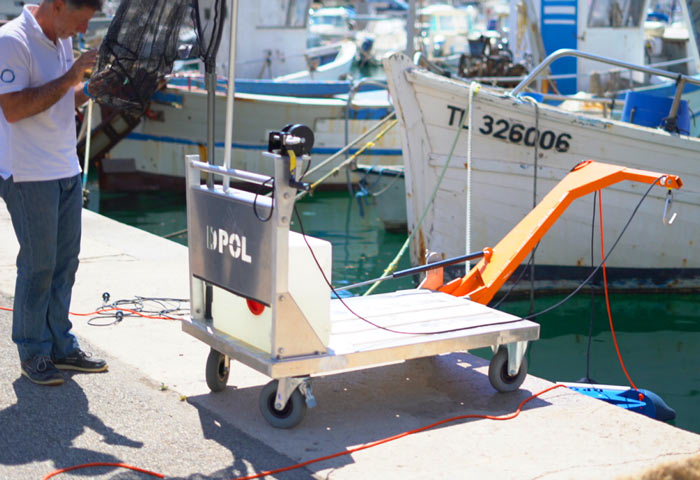
The Classic and HD versions can be easily removed without lifting equipment. Weighing approximately 30 kg, they can be handled quickly by two people.
For added convenience, we offer the DPOL® Lifter trolley, specifically designed to assist with handling the robot and its net.
However, the DPOL® Max and its net require lifting equipment with a capacity of over 500 kg to be safely removed from the water.
What maintenance does the DPOL® require?
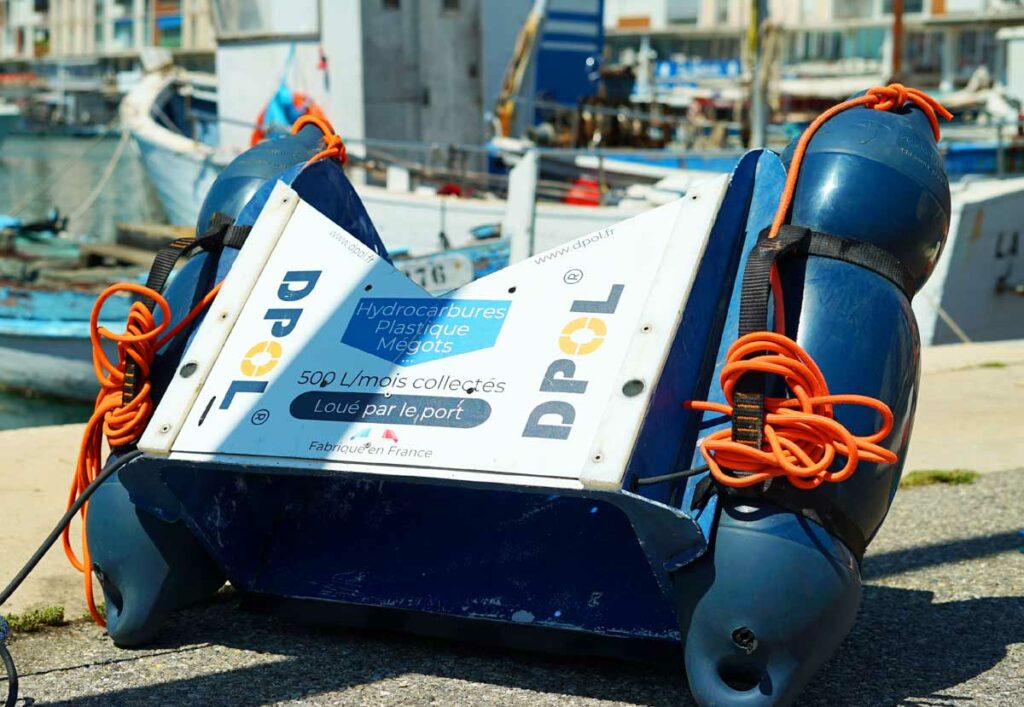
Maintenance of the DPOL® robot is kept as simple as possible. In addition to emptying the net and performing a bi-monthly cleaning, you only need to check the sacrificial anodes once a year.
How to showcase your environmental commitment
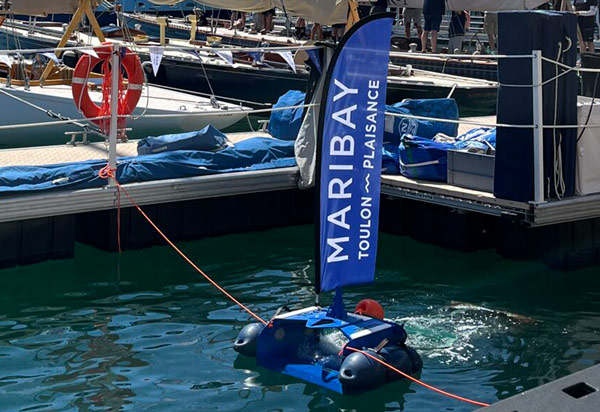
To highlight the environmental commitment of your marina, port, or local authority, we offer several options:
The DPOL® is equipped with two 18 mm diameter flag holders. Custom beachflags can be designed by our team to suit your branding.
We also provide communication plaques that can be mounted on the dock or directly on the floating waste collector.
These accessories not only promote your sustainability efforts but also help increase visibility of the DPOL® for users — especially important in areas where there may be a risk of collision.
One DPOL® or several?
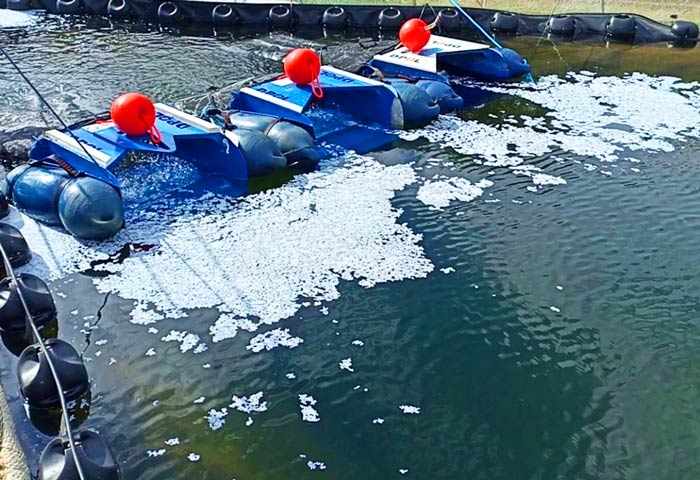
You can deploy a single DPOL® or operate multiple units simultaneously to clean water in a targeted area — whether forming a barrier or working in the presence of currents.
Key factors to consider include the size and layout of your port, and most importantly, the volume of waste to be collected.
As a general guideline, our clients typically use one DPOL® for every 500 berths.
Is a DPOL® without a net still useful?
Yes — even without a net, the DPOL® generates a powerful water current that can help redirect floating waste, algae, or vegetation, making it possible to clear a passage or guide debris toward a collection point.
Can the DPOL® go under a dock?
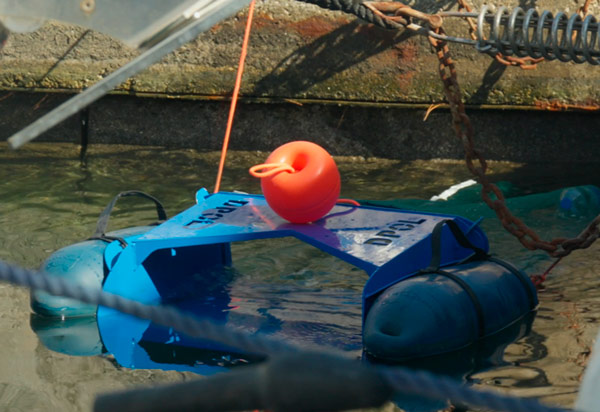
Yes, absolutely. Its low height allows it to fit under most docks and in tight areas.
How should I store the DPOL®?
If you’re not using your DPOL® for an extended period, make sure to clean and rinse it with fresh water. Then store it away from direct sunlight and sea spray.
DPOL® units are designed to be stackable, allowing for compact and efficient storage.
Is the DPOL® fragile?
As of summer 2025, over 220 DPOL® units are in operation — and none have been out of service since their launch. This makes the DPOL® a truly proven and robust waste collector.
It is highly resistant to impact, abrasion, and corrosion, ensuring reliable performance even in demanding environments.
Do you want to distribute DPOL® robots?
Join our distribution network.

